Roger Fisher’s ‘Barracuda’ Gear (and Other Tidbits)
Howard Leese’s Gear Too; Replace Ace?
To me, the Heart tune “Barracuda” is one of those perfect songs. Everything’s great: guitar, drums (watch it on YouTube) and the singing, which is just amazing. We’ve all heard the song hundreds of times, but there’s precious little about the gear Roger Fisher and fellow guitarist Howard Leese used on the tune.
Here’s what Roger had to say about it to WoodyTone, followed by some notes on Howard’s Barracuda gear – as well as some info on how the Wilson sisters got control of Heart, how KISS asked Roger to audition for the band and other interesting items.
WoodyTone: Gear-wise, Barracuda is one of the most studied Heart tunes, in part because of that unique flanger sound. Do you remember what gear you used for that tune?
Roger: A Strat – not sure about the year. I think it was a Music Man head [Leo Fender-designed, solid-state preamp, 6L6 power tubes], don’t remember the wattage. I think we had a little 2×12 cab, maybe custom-made, I would go through, then on stage [at times it was at the front of the stage, facing Roger] we’d throw a baffle in front so I could play it really loud – because the best way I know of getting good sustain while maintaining a fairly clean tone is you just have to go for volume…unless you have the luxury of having close proximity to your amp, pointing right at you at guitar height. The cab had Celestions, but I don’t remember what wattage.
The flanger was a kit that I originally bought from a company called Phoenix Systems from Massachusetts. It’s the same flanger sound used in “Mistral Wind,” and there isn’t really another flanger that sounds like it. This new flanger that came out called the Barracuda flanger, endorsed by Howard Leese, doesn’t sound like that Phoenix Systems flanger. [Obviously his opinion and his ears, but judging by forum activity several folks disagree.]
When I was playing the riff, it was just a fun guitar riff to play so it was just natural to try a few different things. And one of the things we tried was the flanger. It worked, and that was that.
Do you remember where the flanger was in the signal chain? [It was a rack unit.]
I think the Music Man head had an effects loop, and I think the flanger was in the effects loop. I think I had the flanger just about as slow as it could go.
How about those laser-like sounds near the end of the tune? They sound like they have a flanger on them. Was that a synthesizer?
The way that occurred is I was leaning over my amp with my guitar on to adjust something, or maybe a pick had fallen behind the amp or something, and when I got the guitar close to the amp head – the flanger was on – we heard that sound. The producer, Mike Flicker, said, ‘We have to record that sound – it’s really cool! What should we call it?’ I said, ‘Call it Alien Attack.’ So we named it that on the console.
Howard’s ‘Barracuda’ Gear
Howard was also an integral part of Heart, and lasted longer in the band than Roger. the following gear details are from a Vintage Guitar magazine interview, and all quotes are Howard’s.
The guitar was a ’66 Fender Telecaster, used to record ‘Barracuda,’ ‘Magic Man,’ ‘Crazy On You’ and possibly other Heart tunes. Its prior owner was Mars Bonfire, who used it to write and record Steppenwolf’s ‘Born to be Wild.’ Now that’s a Tele with some mojo.
Howard: “I still have it. It’s a ’66 with a painted headstock…. This is the guitar on which the song that contained the first reference to ‘heavy metal’ was written: ‘heavy metal thunder’ [in ‘Born to be Wild’]. It was originally black but I sanded it down to bare wood; you can see that in old Heart photos. Then I retired and restored it. I’ve had it since high school.
“That Tele took me from Los Angeles to Vancouver, and all around the world. I put a humbucker in it, changed the tuners, and added a Yamaha roller bridge and Bigsby. Like we all did in the ’70s, I took it apart and made it the way I wanted it. The only original parts [now], aside from the body and furniture, are the bridge pickup and its stock wiring.”
He thinks his amp on ‘Barracuda’ was a ’56 4×10 Fender Bassman, presumably a combo. “I plugged into both channels and cranked it,” he said.
“I paid $140 for the guitar and $160 for the amp. My entire gear investment was 300 bucks (laughs)! That’s what I went on tour with, that rig and a folding chair for an amp stand.”
Barracuda, Cal Jam 2, Ontario motor speedway, CA, March 1978
Notable: How the Wilson Sisters Became Heart
From Roger’s website, not covered in our interview – but interesting!
“In a nutshell, when my brother Mike was happily with Ann, and Nance and I were happily together, the Heart Partnership was formed. Mike and I, in our wisdom, insisted the girls be given 51% of the rights in the partnership.”
He noted elsewhere on his site: “When the writing for Dog And Butterfly began, our musical and personal relationship had begun to be more strained. There had been a point while recording Little Queen where I mentally and spiritually quit the band, based on decisions being made which, to me, were not done for the right reasons. What I saw that bothered me so much was the power struggle beginning.
“While I think the songs I wasn’t welcome to play on on the Dog & Butterfly album are great, they certainly don’t represent a band. I felt I was being slowly worked out of the lineup. This was a very difficult time for me, as one can imagine.”
Notable: Asked to Replace Ace!
Also from Roger’s website:
“After leaving Heart, KISS approached Heart’s manager Ken Kinnear, saying they were interested in having me audition. I certainly mean no disrespect to a great group, but they didn’t really turn me on at the time. I had Ken ask them what the pay would be. They responded with, ‘Come down and audition, and we’ll take it from there.’
I was unimpressed with that response, so passed on the opportunity and lived a somewhat hermit-like life in the middle of five acres of woods, until I met my second wife, Maureen in 1983.
Notable: More Classic Heart Tunes?
From the website:
“If Ann and Nance could have teamed up with some of the stuff I wrote after leaving, I have no doubt it would have been huge. Derosier and I created some of the highest-energy rock I’ve ever heard, and no one else has heard it.
“I still have these tapes, and if I were Ann, I’d call me and check it out. I know she could put vocals on there that would awaken the dead!”
He added: “I don’t mean to be campaigning for a Heart reunion…that’s not my intention.”
But it may happen because if Heart gets into the Rock and Roll Hall of Fame, it really would have to be the original band.
Interestingly, Howard Leese was not asked to perform on the VH1 Rock Honors show which honored Heart. Here’s what he said about it to Vintage Guitar magazine: “They’re having their current road band play, none of which had anything to do with any of those records. So all the fans are crying foul, they think it stinks. I think it stinks. I’m disappointed. I’m not surprised, but I’m disappointed. The VH1 thing this is fine, but they dare not try that to get in the Hall of Fame…then I’m gonna bitch. But yeah, it stinks, and so does their new band. So, there you have it.”
And: “Ann and Nancy really never gave the band much credit. You never heard them speak about the band members. They were always talking about something they were doing. They never really appreciated or gave the band its due, I thought. All the press and stuff was always focused on them, which is fine because it worked. But it was a little bit funky, especially in the ’80s when the band was really the driving force behind it and the girls really weren‘t the leadership at that time. So yeah, it irks me a little bit. Personally I don’t really care. I think being famous is overrated. But on a musical level, it kind of bothered me that the band never got the credit – how important the band was to the whole overall thing. Let’s just say I had a bigger percentage of the money than I had of the spotlight. I was fine with that.”
Notable
> From the website, on his relationship with Howard Leese: “Howie and I always got along well. I held him in high esteem because of his knowledge of music theory – mine was almost non-existent – and his self-confidence, which, to me, bordered on arrogance…. We co-composed some pretty great guitar solos, and Howie can take sole responsibility for the writing of some them, ‘Straight On’ being one. We didn’t get as close as we might have because I spent most my time with Nance and didn’t go out with ‘the guys’ as much as I otherwise would have.”
– End of part 3 of 3 –
Category: Bassman, Celestion speakers, Howard Leese, KISS, Music Man, Roger Fisher, Strat, Telecaster

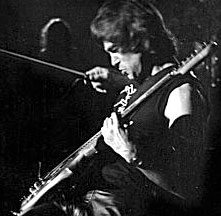
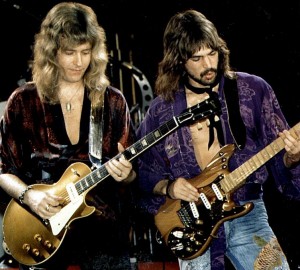




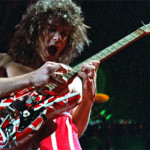
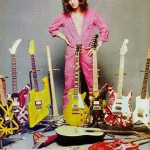
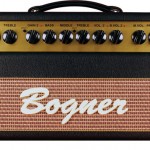
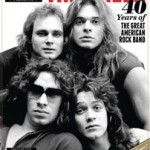
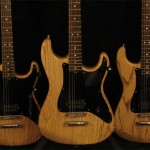
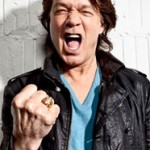
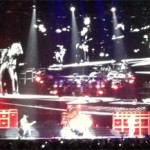
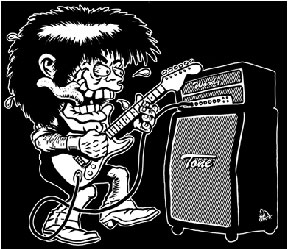

One of the best songs ever – creamiest sound imaginable for those chords. I can't believe that he took such a bare bones rig to gig with him. The lawn chair cracks me up, but some of the most notable sounds are from simple set ups.